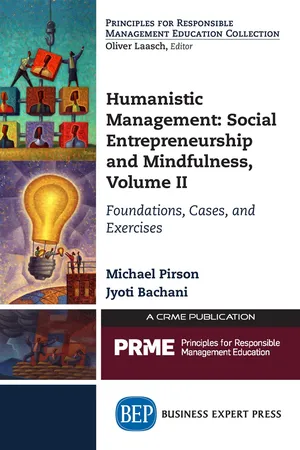
eBook - ePub
Humanistic Management: Social Entrepreneurship and Mindfulness, Volume II
Michael Pirson, Jyoti Bachani, Robert J. Blomme
This is a test
Partager le livre
- 180 pages
- English
- ePUB (adapté aux mobiles)
- Disponible sur iOS et Android
eBook - ePub
Humanistic Management: Social Entrepreneurship and Mindfulness, Volume II
Michael Pirson, Jyoti Bachani, Robert J. Blomme
Détails du livre
Aperçu du livre
Table des matières
Citations
À propos de ce livre
Humanistic management agenda is to protect human dignity and promote societal well-being. The currently dominant theories prioritize economistic goals of profits and productivity at the cost of threatening sustainability. A humanistic perspective offers an alternative for purposeful organizing that serves people and the planet. This two-volume set of books offers humanistic theory and practical exercises on topics of leadership and trust in volume one and social entrepreneurship and mindfulness in volume two. Each topic is introduced with a conceptual lead chapter followed a case-study or exercise to apply and engage using examples.
Foire aux questions
Comment puis-je résilier mon abonnement ?
Il vous suffit de vous rendre dans la section compte dans paramètres et de cliquer sur « Résilier l’abonnement ». C’est aussi simple que cela ! Une fois que vous aurez résilié votre abonnement, il restera actif pour le reste de la période pour laquelle vous avez payé. Découvrez-en plus ici.
Puis-je / comment puis-je télécharger des livres ?
Pour le moment, tous nos livres en format ePub adaptés aux mobiles peuvent être téléchargés via l’application. La plupart de nos PDF sont également disponibles en téléchargement et les autres seront téléchargeables très prochainement. Découvrez-en plus ici.
Quelle est la différence entre les formules tarifaires ?
Les deux abonnements vous donnent un accès complet à la bibliothèque et à toutes les fonctionnalités de Perlego. Les seules différences sont les tarifs ainsi que la période d’abonnement : avec l’abonnement annuel, vous économiserez environ 30 % par rapport à 12 mois d’abonnement mensuel.
Qu’est-ce que Perlego ?
Nous sommes un service d’abonnement à des ouvrages universitaires en ligne, où vous pouvez accéder à toute une bibliothèque pour un prix inférieur à celui d’un seul livre par mois. Avec plus d’un million de livres sur plus de 1 000 sujets, nous avons ce qu’il vous faut ! Découvrez-en plus ici.
Prenez-vous en charge la synthèse vocale ?
Recherchez le symbole Écouter sur votre prochain livre pour voir si vous pouvez l’écouter. L’outil Écouter lit le texte à haute voix pour vous, en surlignant le passage qui est en cours de lecture. Vous pouvez le mettre sur pause, l’accélérer ou le ralentir. Découvrez-en plus ici.
Est-ce que Humanistic Management: Social Entrepreneurship and Mindfulness, Volume II est un PDF/ePUB en ligne ?
Oui, vous pouvez accéder à Humanistic Management: Social Entrepreneurship and Mindfulness, Volume II par Michael Pirson, Jyoti Bachani, Robert J. Blomme en format PDF et/ou ePUB ainsi qu’à d’autres livres populaires dans Negocios y empresa et Ética empresarial. Nous disposons de plus d’un million d’ouvrages à découvrir dans notre catalogue.
Informations
Sujet
Negocios y empresaSous-sujet
Ética empresarialCHAPTER 2
Homeboy Industries: Stopping Bullets with Jobs
R. Duncan, M. Pelly, and Stephen J.J. McGuire
Restoring Dignity of Former Convicts and Gang Members: Challenges and Opportunities
Ramon “Monxi” Flores was sitting in Father Boyle’s office when Carlos came through the door. Carlos was 24, had recently been released from Corcoran State prison after serving a 10-year sentence (Exhibit 2.1). He had a shaved head and was covered in tattoos, including two prominent devil horns on his forehead. He was having a hard time finding a job; he had never had a job before. Father Boyle understood why he might not necessarily get hired right away and gave him an opportunity to work in the Homeboy Silkscreen division. The day after Carlos had started the job, Father Boyle called to ask him how it felt to be working. Carlos replied, “It feels proper…I’m holding my head up high.”1

Exhibit 2.1 Carlos, a client of Homeboy Industries
For nearly 20 years, Father Gregory Boyle, affectionately referred to as “Father G,” “G-Dawg,” or simply “G,” had been on a mission to find jobs for former gang members and ex-convicts, whose “burdens are more than they can bear.” Father Boyle pled his case before audiences nationwide in hope that an employer might be listening and would want to be “a part of the solution (Exhibit 2.2).”2 Homeboy Industries, a nonprofit organization founded by Father Boyle in the East Los Angeles district known as Boyle Heights, was primarily a job development and placement service provider. Although Homeboy Industries had an open door policy, its primary objective was to assist at-risk youth, former gang members, and ex-offenders in finding employment (Exhibit 2.3).

Exhibit 2.2 Father Greg Boyle, Founder of Homeboy Industries

Exhibit 2.3 Homeboy Industries headquarters
Father Boyle entrusted Ramon “Monxi” Flores with the duty of assisting Homeboy Industries’ clients with the difficult task of finding jobs since Monxi was the Employment Supervisor of the Job Developers’ Division. Father Boyle gave Monxi an annual goal to place 1,000 clients in outside employment, a 333 percent increase over the previous year. The reason that Father Boyle assigned such a high figure was due to the incredible surge in former convicts and gang members who were trying to enroll in Homeboy’s training programs, and would therefore need to find employment afterward. Monxi knew that this would not be an easy task. Many employers were concerned with the risks involved in hiring Homeboy Industries’ clients. How could Monxi convince an employer to hire former gang members and ex-convicts? Was knowing that they could change a life enough of a reason for employers to hire from this risky labor pool? What could Monxi do to meet his ambitious goal?
Recidivism and Unemployment for the Ex-Convict Population: A Major Societal Problem
The employment needs of the nation’s ex-offenders were a key issue to policy makers due to the costs of the judicial system and recidivism.3 According to the U.S. Department of Justice, Blacks were six times more likely and Hispanics twice as likely to go to jail compared to Whites.4 The State of California alone, which is designed to house a total of 82,707 inmates, has a current population of more than 137.2 percent of capacity at 113,463 inmates.5 This problem is exacerbated by high recidivism rates. When ex-offender employment programs began to roll out in the early 1960s, program developers recognized that ex-offenders were poorly educated and lacked work experience.6 Therefore, programs for ex-offenders offered job training and job placement. However, many researchers found that those programs had no significant impact on recidivism.7 Today, more than half of the inmates in the state of California return to prison within six months, and teenage felons have an almost three quarter’s recidivism rate.8 While this represents a humanitarian concern, it is also a problem for the state and therefore taxpayers as well, since the cost of housing, feeding, and caring for a prisoner has ju...